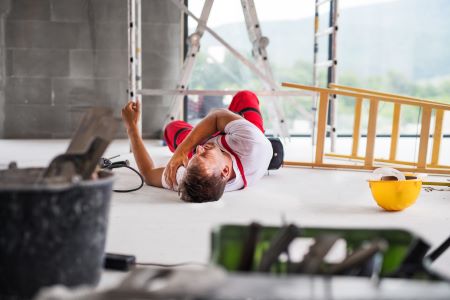Workers’ Comp 101: What to Know About Falls From Heights at Work

Nearly anyone can slip and fall or trip and fall from an elevated surface at work, which often leads to devastating injuries. Depending on severity, the injuries from a fall to a lower level may require medical treatment, time to heal, or rehabilitation, all of which can affect the injured employee’s finances.
Usually, an injured worker is eligible for workers’ compensation benefits following a slip, trip, or fall on the job to cover any medical bills, rehabilitation costs, or lost wages. It is important for any employee who is injured to understand workers’ compensation and how to seek the benefits offered.
Let’s look at what constitutes a fall from a height at work, what your next steps should be after a fall, and how to ensure you get the optimal compensation you deserve.
Jobs Where Falls From Heights Commonly Occur
A fall to a lower level can occur in virtually any workplace setting where there are multiple stories, platforms, or levels. Common job sites with various elevations include:
- Construction sites
- Roofing sites
- Warehouses
- Job sites that require the use of platforms, scaffolding, portable staircases, or ladders
They can even occur in an office building where the railing is broken or an elevator is defective.
Essentially, any job where a worker is performing their duties on a platform, ladder, or any other surface above ground level can lead to a fall from a height.
A Few Fast Facts About Falls From Heights at Work
- Falls from heights are the second leading cause of workplace deaths, following car crashes. (Source)
- The construction industry sees the most fall-related injuries and fatalities. (Source)
- Construction workers are 7+ times more likely to fall at work than those in other occupations. (Source)
- A fall to a lower level can occur at any workplace with multiple levels, even those where employees only work a desk job. (Source)
- Depending on the severity of the injury, it usually takes days or weeks* to heal from a non-fatal fall. (Source)
*Should the fall result in a spinal injury or injury to your central nervous system, it could mean years of healing or permanent damage.
What You Should Do After a Workplace Fall
If you fall to a lower level at work and sustain an injury, it’s crucial to follow the proper steps to receive the workers’ compensation benefits you deserve. After a fall, injured workers or their family members may be eligible to receive compensation to cover medical bills, rehabilitation bills, lost wages, or even death expenses should the fall result in a fatality. If the fall to a lower level results in partial or total permanent disabilities, the injured worker may also be eligible for an additional disability payment based on their impairment rating.
Step 1: Seek Medical Treatment
Your health and safety come first after an injury. Seek emergency medical care immediately.
Step 2: Report the Injury to Your Employer
Let your employer know as soon as possible about your injury. In Georgia, you have 30 days to submit the report, but the sooner you do it, the better.
Step 3: Gather Documentation
Keep all medical records related to your injury, as well as any injury-related paperwork provided by your employer. Request a copy of the accident report if your employer did not provide it. Or, if your employer does not offer a report, write a letter explaining the details of the accident and your injuries. Give a copy to your employer and ask them to sign your copy to prove that they have acknowledged it.
After you complete these steps, your employer and the insurance company will take action.
Your Employer Will File a Claim With the Insurance Company
Your employer will report the accident to their insurance company and file a claim. The insurance company will evaluate the claim and decide whether to approve or deny benefits.
Should your claim be denied, you have the right to appeal.
Step 4: Consult a Workers’ Compensation Attorney
Turn to a trusted workers’ compensation lawyer in your area to ensure your case is handled properly and you receive the benefits you deserve. Your attorney will help the filing process go smoothly. And should your claim be denied or the benefits offered not be enough, your attorney can step in and fight to get you the compensation you need to recover.
What to Do if a Fall From a Height Results in Death
Falls from heights are really dangerous, and injuries from a fall can result in death. When a worker sustains fatal injuries in a fall, surviving family members may be able to obtain death benefits through the employee’s workers’ compensation insurance.
Family members should follow steps 2-4, filing a report with their loved one’s employer within 30 days of the accident, documenting everything, and seeking legal counsel from a workers’ compensation team like the one at Buzzell, Welsh & Hill.
Need Guidance Navigating Your Workplace Fall or Your Loved One’s Fatal Fall From Heights? Talk to Buzzell, Welsh & Hill Today: 478-217-2072.
Were you seriously injured in a fall to a lower level while working? Or did you lose a loved one in a devastating fall-related accident that occurred on the job? The workers’ compensation attorneys at Buzzell, Welsh & Hill are ready to advocate for you and your family and help you obtain valuable workers’ compensation coverage.
Schedule a consultation to tell us about your case today: 478-217-2072
Related Articles
- How Does Workers’ Compensation Work in Georgia?
- What to Do if Your Employer Is Exempt From Workers’ Compensation
- Am I Eligible for Workers’ Compensation?
- What Are Workers’ Compensation Benefits And Other FAQs
Recent Success Stories
